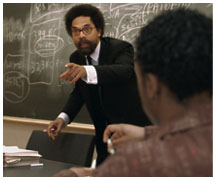Cornel West is a modern Emersonian. Come to think of it, Cornel West may just be the contemporary Emerson: an adventurous Christian thinker who keeps extending the question of what it means to be American, to be modern, to be human. West is entertainingly serious and seriously entertaining. He is a moral and political provocateur, a stylist and individualist. To boot, he’s a prophet without honor at Harvard, as Emerson was after his notoriously unorthodox Divinity School Address of 1837.
an adventurous Christian thinker who keeps extending the question of what it means to be American, to be modern, to be human. West is entertainingly serious and seriously entertaining. He is a moral and political provocateur, a stylist and individualist. To boot, he’s a prophet without honor at Harvard, as Emerson was after his notoriously unorthodox Divinity School Address of 1837.
To celebrate Emerson’s 200th birthday, I am gathering observations for a long public radio conversation on The American Plato and the “God for Bloggers,” who Harold Bloom says is “closer to us than ever.” Cornel West was high on my list, and Monday afternoon we stretched out in his office at Princeton.  Emerson was the American Socrates, the American Hamlet and the American Isaiah, said West warming up. And a modern reading of Emerson keeps alive those prophetic, Shakespearean and Socratic dimensions in American life.
Emerson was the American Socrates, the American Hamlet and the American Isaiah, said West warming up. And a modern reading of Emerson keeps alive those prophetic, Shakespearean and Socratic dimensions in American life.
Cornel West calls Emerson “the towering man of letters in the American democratic experiment,” even if Melville runs deeper. Emerson is, as John Dewey said, “the philosopher of democracy,” even outside the professional guild of philosophers. Acquainted with grief in the death of his first wife, his brothers and his beloved 5-year-old son Waldo, Emerson is “on the way to becoming a blues man,” West observed. But he’s not exactly a blues man, either, not quite in the circle of the moderns that Cornel West honors above all: Chekhov to Coltrane, Melville to Faulkner and Toni Morrison.
Part One of our conversation touches on Emerson’s “self” centeredness and the blues question. In Part Two I am still casting around for the 20th Century Emerson. Given that jazz and film were the great artistic inventions of the American century, it makes sense that Stanley Cavell should nominate Frank Capra for Emersonian standing, or that Harold Bloom should argue for Charlie Parker. I am getting hooked on the idea that Duke Ellington nicely matched Emerson’s ecstatic spirit and patrician common touch. Cornel West argues that the 20th Century Emerson was James Baldwin, the essayist, artist and “democratic saint.” Why not John Updike? Well, listen in.
{ 8 } Comments